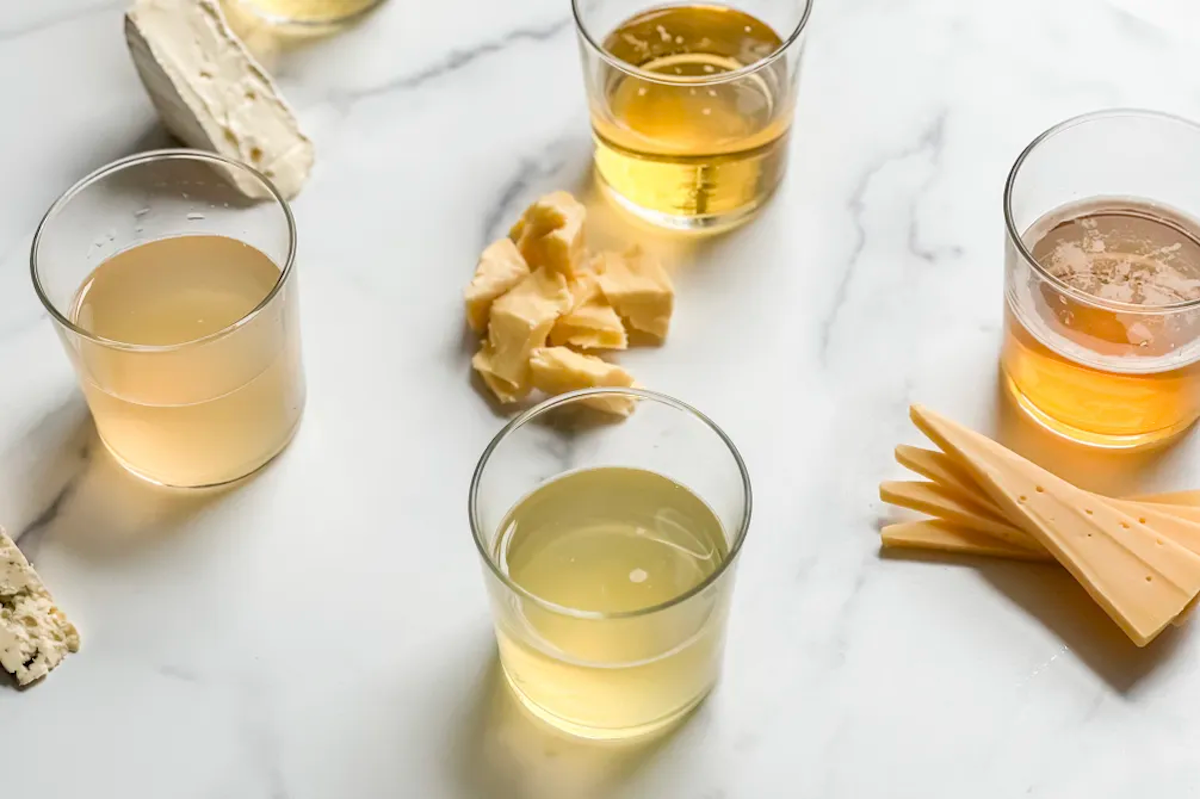5 ways to pair hard cider and cheese, according to an expert

Wine might be the first drink to come to mind when thinking about the perfect cheese pairing. The two have been enjoyed together for hundreds of years — the fruity, tannins from wine cut through the fatty, salty elements of cheese. But that’s not always the case. If you were to pair a big, bold red with a delicate fresh goat cheese, the flavors of the cheese will be overpowered by the intensity of the wine. This is when we turn to fall’s signature beverage — hard apple cider. It comes in a wide variety of styles and flavors, which are made using different varieties of apples and fermentation techniques. When pairing hard cider and cheese, we have to consider a few key factors. What style is the cider — is it dry or sweet? What kind of apples are used to make it? What kind of cheese are we snacking on? All of these contribute to the nuances in flavor, which impact how you pair the two together. For the perfect autumn happy hour, I paired five of my favorite cheeses with different varieties of hard cider.
Bloomy rind cheese and dry cider
The bloomy rind cheese family consists of some of the greats — brie, camembert, soft-ripened goat cheese, and triple crème cheeses. Many of these cheeses have a buttery, rich texture and a milky, delicate taste. A cheese like Camembert will boast earthier notes of mushrooms and crème fraîche, while a soft-ripened goat cheese has a citrusy bite amongst the creamy paste. These fatty cheeses work wonderfully with a crisp, dry cider. Dry cider is typically made using a blend of tart and ripe apples, creating a beverage that is bittersweet and bubbly like champagne. The bubbles in this cider act as a palate cleanser for the buttery elements from the cheese, and it’s not sweet enough to overpower the cheese’s aroma and flavor.
Cheddar and semi-dry cider
Cheddar, on the other hand, is full of sharp, piquant, and creamy tasting notes that might overpower the elements of a crisp dry cider. Depending on the cheese’s age, cheddar can range from being buttery, creamy, and mellow to sharp, powerful, and complex. The zingy notes can be a bit intense on their own, which is why a semi-dry cider is a perfect match. Semi-dry ciders contain more than 2% residual sugar and have a more pronounced apple flavor than dry cider. When discovering new drink pairings, I like to think of food items that pair well together. A sharp cheddar with a sweet gala apple is always a favorite, and this combination plays into that same idea.
Gouda and hopped cider
Gouda is a cow’s milk cheese hailing from the Netherlands with creamy notes of tang, caramel, and butterscotch. Sometimes you can taste a bit of a crunch in aged gouda, due to the delicious cheese crystals that develop during the aging process. Younger gouda tends to be a bit milder and sweeter, while aged gouda develops a stronger, nuttier flavor over time. This style of cider entertains the palate of both a cider and a beer, with notes of apples, floral, citrus, and pine. Together, the flavor is reminiscent of biting into a caramel apple.
Blue and rosé cider
One of my favorite ways pair cheese with drinks is with something pungent and something sweet. Blue cheese is definitely one of the strongest types of cheese, with its peppery bite and creamy texture. Its intensity needs to be balanced with something on the other end of the flavor spectrum. Rose cider is a great match, thanks to the red-fleshed apples that give it its light pink color. The flavor is sweet and fruity, with additional notes of rose and strawberries.
Taleggio and farmhouse cider
Last but not least, time to pair funky with funky! Taleggio is an Italian cow’s milk cheese known for its washed rind — aka the orange sticky outer layer that tends to have a pretty intense aroma. The flavor is actually mild and buttery, but with the combination of the stinky rind, you’ll find an interesting tang. Farmhouse cider is similarly intense, which makes it the perfect match. Farmhouse cider essentially refers to cider that is made with apples on or near the cider mill. A true farmhouse cider is unfiltered, unpasteurized, and historically fermented with native wild yeast that comes with the apples. The funky notes that develop during the aging process are complex, making for a uniquely flavorful dry cider.
Next time you reach for your favorite bottle of wine with your cheese plate, consider trying cider instead! After all, apples are one of the best cheese pairings around.

